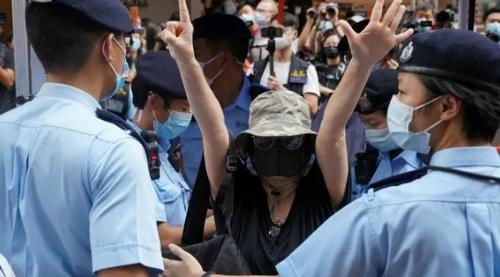by TYLER DURDEN
Picking up where his predecessor left off, President Biden will reportedly warn American businesses this week about the growing risks of operating in Hong Kong as Beijing consolidates its power over the territory, which was supposed to remain legally independent under international law for the next three decades.
Sources close to the White House and its thinking told the FT that Biden is also preparing to impose more sanctions on Beijing tied to the Chinese government’s alleged abuse of Uyghur Muslims in the far-western Xinjiang province, as well as Beijing’s crackdown on political dissent in HK. Examples will include Beijing’s crackdown on the Apple Daily tabloid which was forcibly shuttered by the government despite its popularity over its pro-democracy stance.
And pretty soon, Biden’s warning might to turn into an edict ordering business back home.
On Tuesday, the US will update a warning that the Trump administration issued on Xinjiang last year, according to five people familiar with the decision. The business advisory will stress the legal risks that US companies face unless they ensure that their supply chains are not implicated in forced labour in Xinjiang.
The decision was driven partly by the view that companies were not taking the issue seriously enough.
“The point of the advisory is to stress [that] if you do not exit these supply chains you run a risk of violating US law,” said an official who did not want to be named. “We want to make clear to the business community. . .that they need to be aware of reputational, economic and legal risk of their involvement with entities involved in human rights abuses.”
Assuming the Administration follows through, it will be the first time the Biden White House has issued an advisory related to Hong Kong.
Chinese critics slammed the decision as yet another example of the type of “foreign manipulation” that Hong Kong’s new natsec law was designed to combat (though ironically it was also provoked by the natsec law).
Zhao Lijian, China’s foreign ministry spokesperson, criticized the planned US moves as “typical double standards and political manipulation”.
“Hong Kong’s Basic Law clearly protects foreign investors’ rights and interests,” he told a press conference on Tuesday, referring to the territory’s mini-constitution. He added that any attempt by Washington to “use Xinjiang as a leverage” was “doomed to fail”.
Last week, the Commerce Department added 14 Chinse companies to its export blacklist over alleged involvement in the human rights abuses and surveillance in Xinjiang. Beijing denounced that move as an “unreasonable suppression” and vowed to respond with “necessary measures”.
The White House is also considering a policy that would allow Hong Kong citizens in the US to remain after their visas expire if they face potential political persecution in Hong Kong. But that policy is being debated and is not expected to be part of the package of actions to be announced this week.
Hong Kong has a sizable expat business community (among them are thousands of American bankers and other financial services employees). The American Chamber of Commerce in HK says it has more than 1.2K members and 282 US companies based their regional headquarters in the area in 2020.
US firms are already worried about the possibility that, under the new national security law, Beijing can access any data stored on their servers. And although they were both working on the mainland when they were initially arrested, the cases of Canadian businessmen Michael Korvig and Michael Spavor remain a cautionary tale for any westerner hoping to do business in China.






